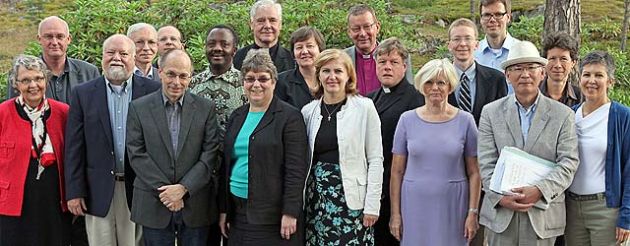Catholics team up with Lutherans to tell Reformation story

For the first time, Lutherans and Roman Catholics have worked together on a global level to tell the story of the Reformation, as part of their commitment for Christian unity.
The publication From Conflict to Communion will be published in May by the Lutheran - Roman Catholic Commission on Unity, the Lutheran World Federation said in a statement Wednesday.
The commission is mandated by LWF and the Vatican's Pontifical Council for Promoting Christian Unity to facilitate the global ecumenical dialogue between Catholics and Lutherans.
"After centuries of mistrust and prejudging between Lutherans and Catholics, we see this [publication] as a great opportunity to reflect together on the burdens of history, and to open more possibilities for witnessing together, not just as individual Christians but as Christian churches," said LWF assistant general secretary for Ecumenical Relations, Rev. Kaisamari Hintikka.
She explained the publication From Conflict to Communion: Lutheran–Roman Catholic Common Commemoration of the Reformation in 2017 contributes to the work for church unity. It will be presented to main governing body of the 70 million LWF, its council which is meeting in June.
The Protestant Reformation was the 16th-century schism within Western Christianity started by people questioning Catholic doctrine and practices such as Martin Luther, John Calvin and other early Protestants.
The publication places in context the 500th anniversary of the Reformation and the 50th anniversary of the Lutheran-Roman Catholic dialogue in 2017.
It builds on important ecumenical milestones especially the Joint Declaration on the Doctrine of Justification.
The Joint Declaration on the Doctrine of Justification is a document agreed to, by the Catholic Church's Pontifical Council for Promoting Christian Unity and the Lutheran World Federation in 1999, following extensive dialogue.
It states that the churches now share "a common understanding of our justification by God's grace through faith in Christ."
The document resolved s the conflict over the nature of justification , at the root of the Protestant Reformation.
Hintikka emphasized that writing together From Conflict to Communion has been possible because of the process of deepened mutual understanding between Lutherans and Catholics that led to their joint declaration.
LWF and PCPCU representatives jointly signed their joint declaration on October 31, 1999 in Augsburg, Germany, officially declaring that mutual condemnations at the time of the 16th century Reformation do not apply to their current teaching.
"Through From Conflict to Communion Catholics and Lutherans confess that they are responsible for the fracturing of the unity of the Church.
"At the same time the document sets the remembering of the Reformation anniversary as a possibility for new efforts both in healing of memories as well as in restoration of Christian unity," Hintikka said.
She emphasized that though a challenging task, one of the opportunities of the 500th anniversary will be to broaden the understanding of the ownership of the legacy of the Reformation beyond churches of the Reformation.
"The insights of the Reformation were so powerful that they not only significantly shifted the theological and spiritual understandings but also challenged the prevailing perceptions of structures of societies and the self-understanding of human beings," Hintikka said.